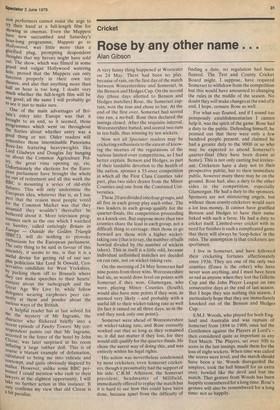Cricket
Rose by any other name...
Alan Gibson
A very funny thing happened at Worcester on 24 May. There had been no play. because of rain, on the first day of the match between Worcestershire and Somerset, in the Benson and Hedges Cup. On the second day (three days allotted to Benson and Hedges matches) Rose, the Somerset captain, won the toss and chose to bat. At the end of the first over, Somerset had scored one run, a no-ball. Rose then declared the innings closed. After the requisite interval. Worcestershire batted, and scored two runs in ten balls, thus winning by ten wickets.
Now not all Spectator readers may be cricketing enthusiasts to the extent of knowing the niceties of the regulations of the various limited-over competitions, so I had better explain. Benson and Hedges, as part of their laudable devotion to the health of 'the nation, sponsor a 55-over competition in which all the First Class Counties take part, plus two sides drawn from the Minor Counties and one from the Combined Universities.
These 20 are divided into four groups, and all five in each group play each other. The two leaders in each group .qualify for the quarter-finals, the competition proceeding as a knock-out. But suppose more than two counties share the lead in each group, not a difficult thing to envisage: then those to go forward are those with a higher wickettaking rate (that is to say, the number of balls bowled divided by the number of wickets taken). This in itself is a little odd, because individual unfinished matches are decided on run rate, not on wicket-taking rate.
On the morning of 24 May Somerset had nine points from three wins. Worcestershire had six, so would draw level on points with Somerset if they won. Glamorgan, who were playing Minor Counties (South), would also have nine points if they won, as seemed very likely – and probably with a useful lift to their wicket-taking rate as well (in fact it rained on all three days, so in the end they took only one point).
Somerset were ahead of Worcestershire on wicket-taking rate, and Rose correctly worked out that so long as they remained so, it did not matter if they lost, for they would still qualify for the quarter-finals. He chose the surest way of doing this, and was entirely within his legal rights.
His action was nevertheless condemned by most cricketers, even Somerset cricketers, though it presumably had the support of his side. C.R.M. Atkinson, the Somerset president, headmaster of Millfield, immediately offered to replay the match but it is hard to see how this could have been done, because apart from the difficulty of finding a date, no regulation had been flouted. The Test and County Cricket Board might, I suppose, have required Somerset to withdraw from the competition but this would have amounted to changing the rules in the middle of the season. No doubt they will make changes at the end of it and, I hope, censure Rose as well.
For what was flouted, and if I sound too pompously establishmentarian I cannot help it, was the spirit of the game. Rose had a duty to the public. Defending himself, he pointed out that there were only a few hundred people present, and claimed he had a greater duty to the 9000 or so who may be expected to attend Somerset's quarter-final (they have been drawn at home). This is not only canting but irrelevant. Cricketers have a duty not to their prospective public, but to their immediate public, however many there may be on the ground. Rose had, also, a duty to the other sides in the competition, especially Glamorgan. He had a duty to the sponsors. Sponsors are not ministering angels, but without them county cricketers would earn a lot less money. It cannot have gratified Benson and Hedges to have their name linked with such a farce. He had a duty to cricket itself. Limited-over cricket with its need for finishes is such a complicated game that there will always be loop-holes' in the rules. The assumption is that cricketers are sportsmen.
I live in Somerset, and have followed their cricketing fortunes affectionately since 1936. They are one of the only two counties (Essex is the other) who have never won anything, and I must have been so sad as anyone when they lost the Gillette Cup and the John Player League on two consecutive days at the end of last season. But I hope they win nothing this season. I particularly hope that they are immediately knocked out of the Benson and Hedges Cup.
S.M.J. Woods, who played for both England and Australia and was captain of Somerset from 1894 to 1906, once led the Gentlemen against the Players at Lord's – then considered quite as important as any Test Match. The Players, set over 500 to score in the last innings, made them for the loss of eight wickets. When time was called the scores were level, and the match should have been a tie. Woods disregarded the umpires, took the ball himself for an extra over, bowled like the devil and lost the match. That gesture from Woods has been happily remembered fora long time. Rose's gesture will also be remembered for a long time: not so happily.






































 Previous page
Previous page